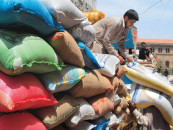The long war
Establishing military presence in a hostile environment is a dangerous business.

Establishing military presence in a hostile environment is therefore dangerous business. But that is precisely what the US plans to do in Iraq, Afghanistan and Pakistan. A combination of bases in comparatively safe areas and diplomatic missions converted into fortresses is its recipe to make up for the less-than-friendly surroundings.
The real reasons may vary: preventing Iran from dominating its neighbourhood; maintaining a foothold in regions of strategic significance; or having a reluctance to beat a retreat from lost battlefields. The rationale, of course, is different: training of local forces; overseeing a transition; and, when nothing else gels, ‘fighting terror’. Security of sensitive installations can always justify the presence of armed groups like Xe Services and DynCorp. The local population may not like it but, since all three regimes depend heavily on US support, they are not likely to do much about it. The problem is that not everyone in these countries intends to do nothing.
When the Iraqis will take charge of their country and how they will deal with the remnants of the occupation is not clear, but the developments in the AfPak region indicate that the clash may take place sooner rather than later.
The framework, announced in Lisbon, to withdraw from Afghanistan was a political expediency; to placate domestic constituencies and maintain unity in Nato ranks. As an exit strategy, it is unworkable. The Afghan National Army, regardless of its strength or state of training and equipment, cannot ensure security in any part of the country. Where the mightiest of the armies have failed, an ethnic hybrid would have no chance. Security in Afghanistan has always been a function of the broadest possible consensus. An Afghan-led reconciliation process was therefore agreed upon and even proclaimed, but the US military and some of the vested interests want to give war another chance.
Many of them argue that before any meaningful negotiations the Taliban must be weakened. Reinforcing failure is one way to describe it, digging deeper into the hole, another. The militaries, in any case, know nothing better, and hate to concede defeat. The war lobby has two scapegoats. Karzai, who controls neither the money nor the military, is blamed for the deteriorating security situation and Pakistan, for its failure to seal the AfPak borders (who can?). Consequences are obvious. This war is doomed to deepen and widen, drones amply contributing to its proliferation.
Whatever else may happen, when the fireworks intensify, one thing is certain. Some of our angry factions, who up to now could do no more than target this quisling government and its tentacles, will join the battle against the US and its allies.
Those who had suggested creating these fortresses must have been blessed with foresight and will no doubt claim credit, but a game theorist would describe all this as acts of pre-emption that inevitably lead to mutual escalation. Whoever said it would be a long war was very prophetic.
Published in The Express Tribune, January 10th, 2011.



















COMMENTS
Comments are moderated and generally will be posted if they are on-topic and not abusive.
For more information, please see our Comments FAQ